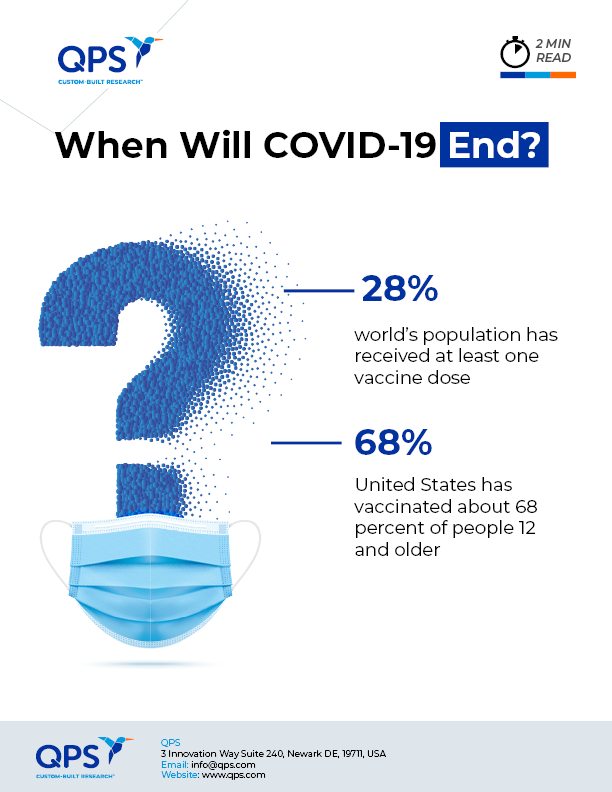Eighteen months have passed since the World Health Organization declared COVID-19 a pandemic on March 11, 2020. The pandemic has upended society as we know it, shuttering businesses, disrupting supply chains, and dramatically impacting our way of life. With this in mind, it’s no surprise that someone might ask: When will COVID end? The answer is a bit complicated. Read on to find out more.
When Will COVID Go From “Pandemic” to “Endemic”?
To understand when COVID might “end,” we have to explore the nature of a “pandemic” illness as opposed to an “endemic” illness. Per National Geographic, when the worldwide spread of a disease is brought under control in a specific area, scientists can classify the illness as “endemic” instead of “pandemic.” Saad Omer, an epidemiologist and director of the Yale Institute for Global Health, told National Geographic that, at that stage, COVID-19 will be a circulating virus that’s “less consequential as we build immunity.” In other words, COVID-19 may be a permanent presence in the world; however, the disease will pose less risk to individuals as the medical community’s approach continues to evolve. For reference, other endemic diseases include influenza and malaria. While these diseases are still present, they don’t require the sort of intensive lockdown measures we’ve come to associate with COVID-19.
Comparing COVID to Eradicated Diseases
What would it take to effectively wipe COVID-19 from the face of the Earth? National Geographic explains that this expectation may not be realistic. The publication interviewed Joshua Epstein, a professor of epidemiology in the New York University School of Global Public Health, to understand why. Epstein argues that “eradication” – the act of completely eliminating a disease – is so rare that medical professionals should direct their energy elsewhere. Diseases “retreat to their animal reservoirs, or they mutate at low levels,” Epstein told National Geographic. “But they don’t typically literally disappear from the global biome.” In fact, as National Geographic reports, only two human or animal-affecting diseases have been successfully eradicated: smallpox and rinderpest, the latter of which was a viral disease that killed cattle. For that reason, some experts are turning their sights to COVID minimization, not eradication. “Until very recently, I was hopeful that there was a possibility of getting to a point where we had no more COVID,” Eleanor Murray, an epidemiologist at Boston University, told Vox in a recent article. Now, Vox writes, she believes that “it is infeasible, in the short term, to aim for an eradication goal.”
How Vaccinations Can Help End COVID
While COVID eradication may or may not be a realistic goal at this time, the medical community agrees on one thing: vaccinating the majority of the population will prevent the virus from mutating further, saving lives and reducing the spread of COVID-19. Unfortunately, the world has a long way to go. National Geographic reports that, to date, only about 28 percent of the world’s population has received at least one vaccine dose. The European Union has at least partially vaccinated the majority of its eligible population, and the United States has vaccinated about 68 percent of people 12 and older. The worldwide vaccination campaign clearly needs to continue, as vaccines are proven to reduce disease – and even eradicate them, in the cases of both smallpox and rinderpest. “In both instances, intensive global vaccination campaigns brought new infections to a halt,” National Geographic writes. Regardless of when – or if – COVID will end, vaccines appear to be the most feasible way forward.
_____
When will COVID end? The answer remains unclear. As LinkedIn News recently noted, many experts expect COVID-19 to end up like a common cold or flu – but enough people have to get vaccinated in order for that to happen, they say. While full virus eradication may be beyond our grasp, continuing to vaccinate the global population is a clear opportunity to transition COVID-19 from a pandemic problem to an endemic problem.
Did you enjoy this blog post? Check out our other COVID-related blog posts or features on our Webinar page.
QPS is a GLP- and GCP-compliant contract research organization (CRO) delivering the highest grade of discovery, preclinical and clinical drug research development services. Since 1995, it has grown from a tiny bioanalysis shop to a full-service CRO with 1,100+ employees in the U.S., Europe and Asia. Today, QPS offers expanded pharmaceutical contract R&D services with special expertise in neuropharmacology, DMPK, toxicology, bioanalysis, translational medicine and clinical development. An award-winning leader focused on bioanalytics and clinical trials, QPS is known for proven quality standards, technical expertise, a flexible approach to research, client satisfaction and turnkey laboratories and facilities. Through continual enhancements in capacities and resources, QPS stands tall in its commitment to delivering superior quality, skilled performance and trusted service to its valued customers. For more information, visit www.qps.com or email info@qps.com.








